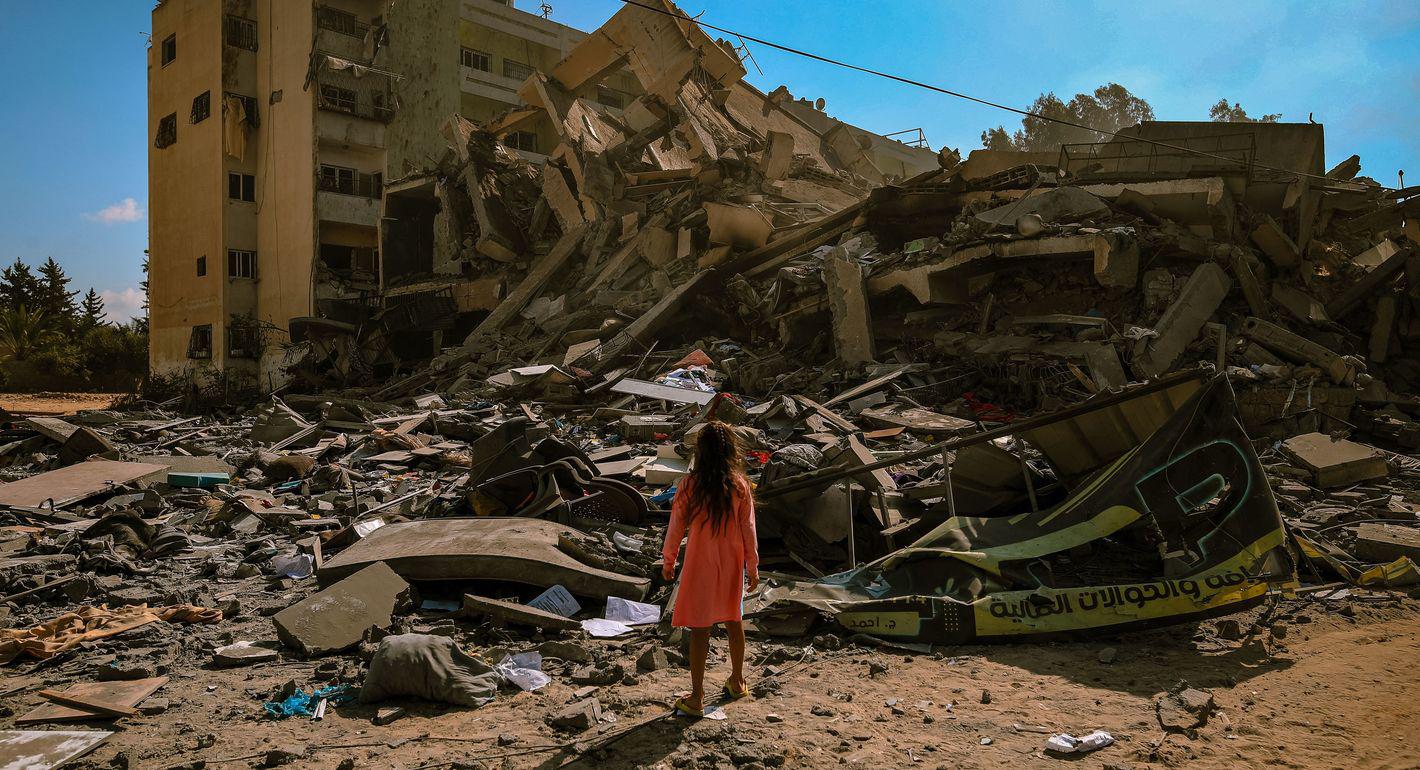Six months into the conflict, Hamas continues to challenge the Israeli army—raising questions about Israel’s ability to eradicate the group.
Reham Owda
{
"authors": [
"Mona Jebril"
],
"type": "commentary",
"blog": "Sada",
"centerAffiliationAll": "dc",
"centers": [
"Carnegie Endowment for International Peace"
],
"collections": [
"The Gaza War and Regional Reverberations"
],
"englishNewsletterAll": "menaTransitions",
"nonEnglishNewsletterAll": "",
"primaryCenter": "Carnegie Endowment for International Peace",
"programAffiliation": "MEP",
"programs": [
"Middle East"
],
"projects": [],
"regions": [],
"topics": []
}
Source: Getty
Although it claims to be acting in self-defense, in its war against Hamas, Israel is exacting a terrible toll on innocent life.
On October 7, Palestinians in Gaza woke up to the news of Hamas’ attack on Israel. They were surprised as the rest of the world—including Israel itself, which is known for its sophisticated intelligence and security systems. But they soon found themselves on the verge of a fifth war with Israel, with the Israeli defense minister announcing a “complete siege” of Gaza in a fight against “human animals.”
Israel is now using its force to an unprecedented level against unarmed civilians in Gaza, violating international humanitarian law with complete impunity. The indiscriminate killing, injuring, and displacement of large segments of the population and the consistent attacks on residential areas have often been justified as targeting Hamas, with civilian death as collateral damage. But people in Gaza are not numbers, and wiping entire families off the face of the earth cannot be justified. Israel’s intense airstrikes on the Gaza Strip are simultaneously endangering the lives of Israeli and other international civilians held captive in Gaza. Al-Jazeera has also reported that Hamas says that it offered to release two hostages, but Israel refused to receive them, which Israel has rebuffed as propaganda. In this sense, Israel’s weaponization of both innocent Palestinian and Israeli civilians seems to extend beyond the declared war rationale to eliminate Hamas, and advance a wider far-right political agenda that may include mass ethnic cleansing of Palestinians by removing them from Gaza.
Even before the war, the Gaza Strip was described as uninhabitable, but a tightened siege leaves the population in even more dire straits. For Israel, this form of collective punishment is a military tactic. Not only does the total siege cut off Hamas’ access to fuel and electricity, but it may also weaken the morale of its fighters and their physical ability to sustain a military confrontation. A prolonged siege may also gradually dismantle the social fabric of Gaza by forcing people to fight over scarce resources. Importantly, Israel’s complete control over whether to allow humanitarian aid to enter Gaza also helps to distract from the atrocities that it commits against civilians. For example, soon after the attack on Al-Ahli hospital in Gaza on October 17, as sources were working to verify who was responsible, Israel announced a deal with Egypt to allow humanitarian aid trucks to enter through Rafah crossing. This was primarily a political gesture, as the amount of aid was nowhere near enough—described by a World Health Organization official as a “drop in the ocean of need”—but it aimed to shift media coverage away from the atrocities and towards the question of aid.
Finally, a total siege of Gaza—alongside an expanding Israeli ground invasion—also reveals Israel’s attempt to create conditions in which Palestinians are forced to choose between being killed or evacuating the Strip, in an act of “consensual” expulsion. As Israel forces continue their ground and aerial assault, further destruction is expected in the northern and central areas of Gaza to dismantle Hamas’ underground tunnels network and destroy its military capabilities. Israel already ordered over one million Palestinians to evacuate the north of the Gaza Strip, and continues to launch airstrikes throughout the territory. But it is very likely that a ground invasion would also spread to southern Gaza, with the goal of pushing as many Palestinian families as possible to flee into Sinai desert.
Israel’s war on Gaza and its continuous violations of international law signal a grave failure of the international legal, political, and diplomatic means to end the Israeli occupation of Palestine and achieve justice and peace in the region. Developments over the coming days and weeks are difficult to predict, but what is certain is that innocent civilians are paying the heaviest price. The international community must no longer turn a blind eye to Palestinian death and displacement, and should ensure that all civilians—both Palestinian and Israeli— are protected through a ceasefire and a negotiated political settlement. We must end the cycle of violence, before the point of no return.
Dr. Mona Jebril is a Research Associate at the University of Cambridge Centre for Business Research. She is an interdisciplinary social scientist focused on Gaza and conflict-affected areas in the Middle East. Follow her on X @Mona_Jebril.
Mona Jebril
Carnegie does not take institutional positions on public policy issues; the views represented herein are those of the author(s) and do not necessarily reflect the views of Carnegie, its staff, or its trustees.
Six months into the conflict, Hamas continues to challenge the Israeli army—raising questions about Israel’s ability to eradicate the group.
Reham Owda
Iran’s adventurism may push Damascus to commit to Saudi-led efforts and reintegrate into the Arab fold.
Faysal Abbas Mohamad
By unconditionally supporting Israel’s war, Germany is increasingly isolating itself on the global stage.
Lena Obermaier
Saudi Arabia has long been perceived in the Arab world as a champion of the Palestinian cause, but developments over the past two decades suggest an imminent transformation.
Safa Nasser
The story of Reham, a young mother sheltering in Rafah, illustrates the impact of Israel’s war on women and families.
Shahd Safi